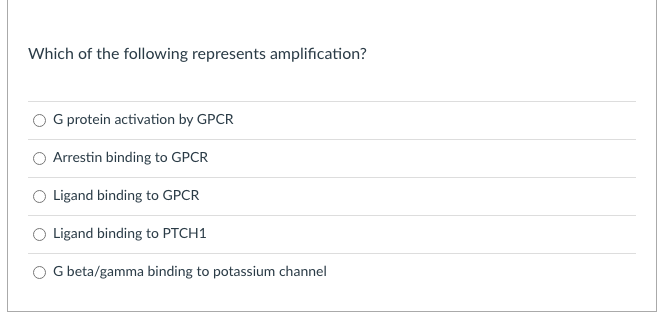Which of the following represents amplification? O G protein activation by GPCR O Arrestin binding to GPCR O Ligand binding to GPCR O Ligand binding to PTCH1 G beta/gamma binding to potassium channel
please help

Signal transduction is the process by which a chemical or physical signal is transmitted through a cell as series of molecular events, most commonly protein phosphorylation catalyzed by protein kinases, which ultimately results in a cellular response. GPCR or G-protein coupled receptors are the largest and most diverse group of membrane receptors in eukaryotes.
Third option is correct because when a ligand binds to cell-surface receptor like GPCR, the receptor's intracellular domain changes in configuration. This change in the receptor sets off the series of signalling events including activation of G-protein, adenylyl cyclase, PKA, phosphorylase b, and the target enzyme in a series of reaction in which activation of one molecule stimulates the activation of the next molecule. This transfer of signal from ligand from GPCR surface to target increases the strength due to involvement of many secondary messengers like cAMP is known as Signal amplification.
First option is incorrect because the signal from the ligand is transferred to GPCR which transfers to G-protein causing its activation and thus activation of G-protein by GPCR does not represent signal amplification.
Second option is incorrect because Arrestin binding to GPCR does not amplify the signal but regulates the transfer of signal.
Fourth option is incorrect ligand binding to PTCH 1 suppresses the release of another protein smoothened and does not cause signal amplification.
Fifth option is incorrect because G-gamma and beta binding to potassium channel does not amplifies the signal.
Step by step
Solved in 3 steps


